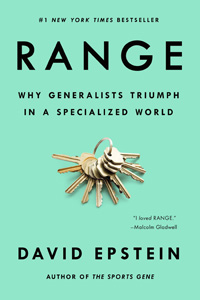 David Epstein, Range: Why Generalists Triumph in a Specialized World (New York: Riverhead Books, 2019), 352pp.
David Epstein, Range: Why Generalists Triumph in a Specialized World (New York: Riverhead Books, 2019), 352pp.
A review by Brad Keister, former Deputy Division Director of the Physics Division for the National Science Foundation. In 2018, Brad retired from the more formal demands of research and teaching, and lives in northern Virginia.
David Epstein has degrees in environmental science and journalism, and has worked as an investigative reporter for ProPublica and a senior writer for Sports Illustrated. You might say that he's a generalist. In this best-selling book, he turns his attention to the popular notion that adult success is tied to specialization and concentration at the earliest possible age. He begins with the widely told story of Tiger Woods, whose father had him hitting golf balls with clubs almost as tall as he was, and before he learned to talk. Tiger Woods’s early career was certainly a success story, but should it be the norm?
Epstein counters the Woods story with another narrative—that of tennis champion Roger Federer, who enjoyed playing any sport with a ball, and who settled upon tennis only as an adult. This is followed by other examples, such as Vincent Van Gogh, who failed at everything he tried until he took up painting in his late twenties.
Having argued that early specialization is not essential for success as an adult, Epstein pushes the question even further: whether early specialization is even useful for most professions. Specialization is not inherently bad, and many of us gain employment based upon some sort of expertise. But in today’s complex world, many breakthroughs and discoveries will depend upon our ability to make a connection between two seemingly different realms of ideas. Countless Nobel Prizes in the sciences have been awarded for work whose origins bear little relation to the eventual accomplishments.
The emphasis on specialization also affects what and how we learn. The chapter “Learning, Fast and Slow” is a stark reminder that students often see the education process as a narrow one of acquiring procedures (rules) for solving problems, in spite of the best efforts of teachers who try to convey a broader, concept-based mentality that enables one to solve a new problem not seen before.
Epstein's book has many anecdotes and summaries of studies that illustrate the advantages of the generalist’s approach to the world. Generalists who read this book will likely be pleased to find affirmation of their perspective. For the specialists, one can turn to Malcolm Gladwell, whose own books have supported the idea of early specialization, but who writes of Range, “For reasons I cannot explain, David Epstein manages to make me thoroughly enjoy the experience of being told that everything I thought about something was wrong.”
Dan Clendenin: dan@journeywithjesus.net


